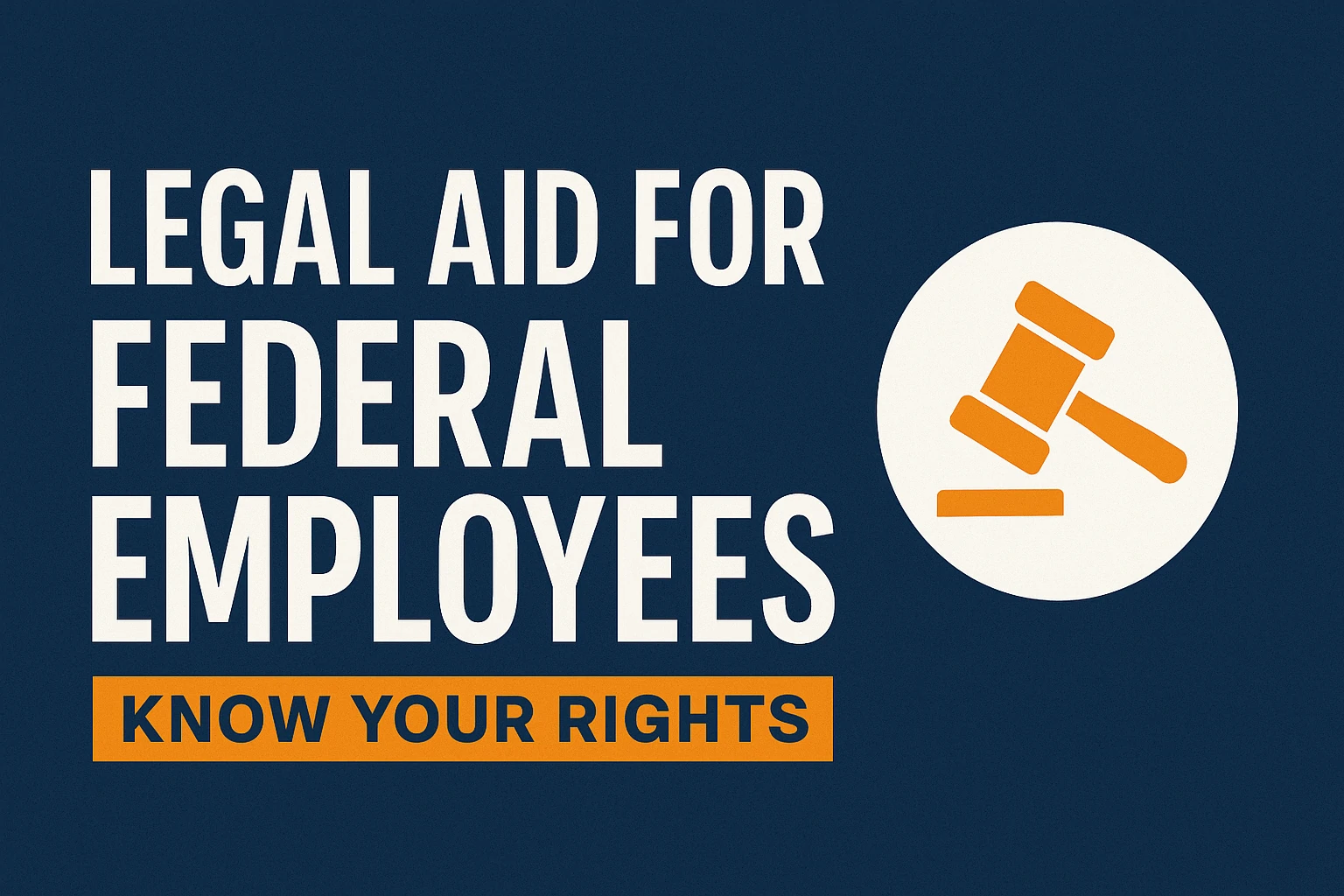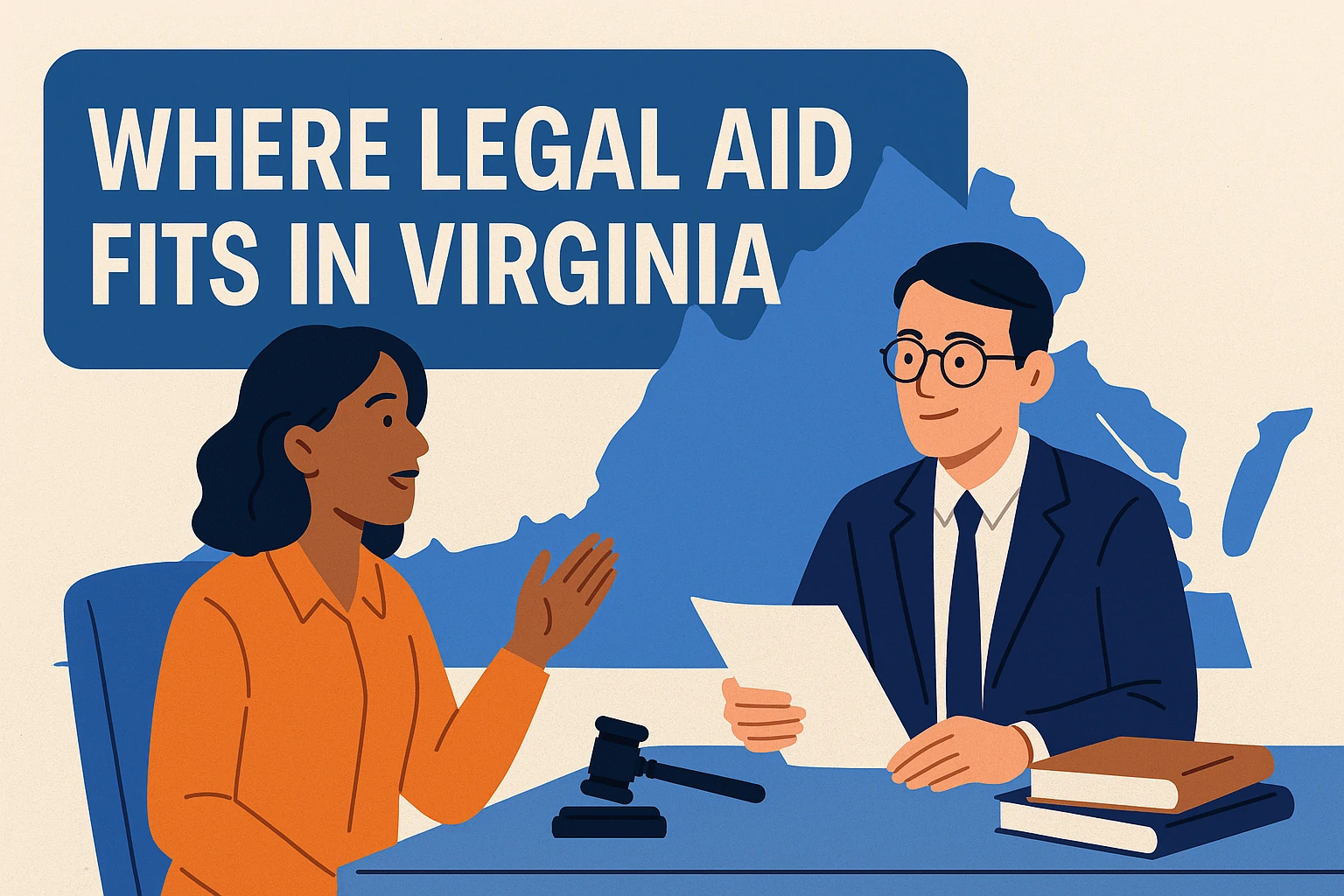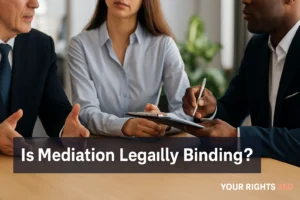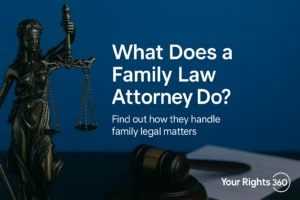Losing a federal job in Virginia can hit hard. Many workers feel confused or helpless after they get fired. Some feel the system turned on them. Others fear they have no way to fight back. In most cases, they just want answers.
Federal jobs often give more job security than private ones. But they also involve rules that are tough to understand alone. The process after termination is not easy. It includes deadlines, legal terms, and steps that must be followed closely.
Legal aid can help. It gives support to those who cannot afford a private lawyer. It offers advice, action, and hope. People in Virginia who lose federal jobs should know they have a right to speak up. The law gives them tools to fight back.
This guide breaks down how legal aid works for federal employees in Virginia. It covers your rights, where to get help, and what to do next. Each part uses plain language and avoids legal jargon. The goal is to give you a path forward without confusion.
Understanding Federal Employment in Virginia
Federal workers in Virginia serve in many roles. Some work in military offices. Others serve in health, education, or law enforcement. No matter the job, federal employment runs under its own rules.
Most federal workers are not “at-will.” That means their employer cannot just fire them without reason. The agency must give a fair process. That process includes notice, a clear reason for termination, and a chance to reply. This system helps protect workers from unfair treatment.
Even when a person gets fired, the law allows them to appeal. Some take their case to the Merit Systems Protection Board. Others file claims with the Equal Employment Opportunity Commission. In many cases, employees must act fast. Missed deadlines can close the door to legal help.
Virginia follows all federal protections. It also offers more help through legal groups, nonprofit services, and employee assistance programs. Many of these services focus on job disputes, wrongful termination, and related issues like filial responsibility laws that may affect federal employees.
What Is the Merit Systems Protection Board (MSPB) and How Does It Help?
The Merit Systems Protection Board protects the rights of federal workers. It reviews agency decisions that remove or punish employees. The goal is to make sure every worker gets fair treatment under the law.
If a federal employee loses a job, they can appeal through the MSPB. The appeal must show that the agency acted unfairly or broke a rule. The Board then reviews all details before giving a final decision.
Most workers must file within thirty days of termination. The Board studies the facts, listens to both sides, and then gives a ruling. This process helps stop bias or abuse of power inside federal offices.
Legal aid can help with these appeals. It guides workers on how to file forms and present proof. With a lawyer’s help, a federal worker has a stronger chance to protect their job or record.
Can You File a Discrimination Claim After a Federal Job Loss?
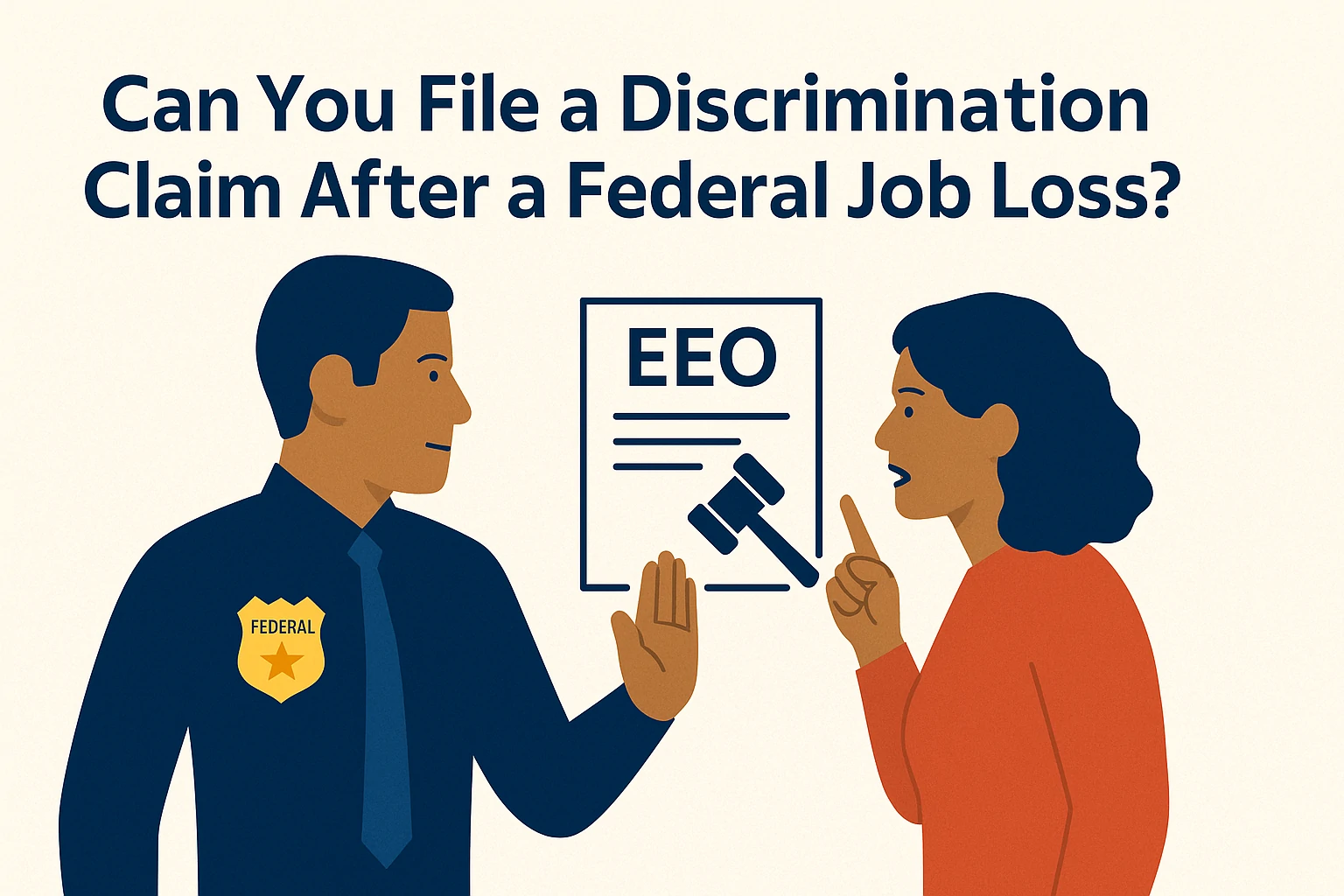
Federal law protects workers from discrimination in every agency. No one should lose a job because of race, gender, religion, age, or disability. These rights stay in place even after a worker gets fired.
If you believe bias led to your removal, you can file a complaint with the Equal Employment Opportunity Commission. This agency checks if the employer treated you unfairly. The process starts with a written complaint and ends with a final review or decision.
Legal aid can help prepare your complaint and collect evidence. It also helps you meet all filing deadlines. A legal expert can explain which laws apply, such as the Civil Rights Act or the Americans with Disabilities Act.
If the agency or Board confirms discrimination, you may win back pay or even reinstatement. These steps protect federal workers and make sure no one loses a job for unfair reasons.
Can Federal Workers Sue the Government for Wrongful Termination?
Filing a lawsuit against the federal government is not easy. Federal workers do not follow the same rules as private employees. Most must go through appeals before taking the case to court.
The Merit Systems Protection Board handles most job-related disputes. If the Board does not fix the problem, the worker may ask a higher court to review the case. This step takes time and often needs a strong legal team.
Some workers sue in federal court if their rights were clearly violated. Cases that involve race, religion, age, or disability may fall under civil rights laws. These claims must follow strict steps and deadlines.
Legal aid can help you understand if you qualify to sue. They may guide you through the appeal first. Then they help decide if court is the right next move. Most workers find answers without going to trial, but the law still gives this option when needed.
Common Reasons Federal Workers Get Fired
Some federal employees lose their jobs after poor reviews or missed goals. Others face claims of breaking rules or failing to follow orders. Job loss may also come after new leadership takes control or when office politics create tension.
In many cases, the reason does not seem fair. A worker may speak up about fraud and then face removal. Others may feel pushed out due to race, religion, gender, or age. Some lose jobs after asking for medical leave or a simple change to their work setup.
A supervisor might offer a reason, but that does not always make it right. Federal rules protect workers from unfair treatment. Legal aid helps review the facts. If your rights were ignored, you may have a case. A trusted legal team can help clear your name and seek justice.
Legal aid gives free or low-cost help to people who cannot pay private legal fees. These groups serve people across Virginia, including those who once worked in federal jobs.
When you reach out, they listen to your case. They check if you qualify. If so, they may assign you a lawyer or legal staff member. That person will review your documents and help you prepare a legal response.
Legal aid can help file appeals, write letters, collect evidence, and prepare for hearings. Their staff understands federal law and agency procedures. That makes them useful for workers trying to get answers or justice after losing their jobs.
Many legal aid offices also help with related issues. These may include lost pay, denied benefits, or wrongful accusations. Some groups help with housing or family needs if your job loss affects other parts of your life.
Where to Find Legal Aid in Virginia
Legal help exists in every region of the state. Many programs cover multiple counties or serve people by phone or online.
Workers near Washington D.C. often reach out to Legal Services of Northern Virginia. They cover areas like Fairfax and Arlington. People in southern or central parts of the state may turn to Virginia Legal Aid Society or Legal Aid Justice Center. These groups handle a wide range of job-related cases.
If you live near the mountains, Blue Ridge Legal Services may assist. Other nonprofit firms offer help to veterans, government employees, or workers in special job sectors.
Some private attorneys also volunteer with legal aid programs. If a case involves complex issues, these lawyers may step in. You still pay little or nothing, depending on your income and case type.
How to Apply for Legal Aid Services
Start by calling or visiting the legal aid group closest to you. Their staff will ask questions about your income, job, and recent termination. These details help them decide if you qualify.
Once approved, you will speak to a lawyer or legal team. They may ask for papers like your firing notice, job reviews, or HR emails. These items help build your case.
The process is simple. You do not need legal training. Just share the facts and ask clear questions. The legal aid team will guide the rest.
If one group cannot take your case, ask them to refer you. Many organizations work together and can help you find the right support.
What to Bring to Your First Legal Aid Meeting
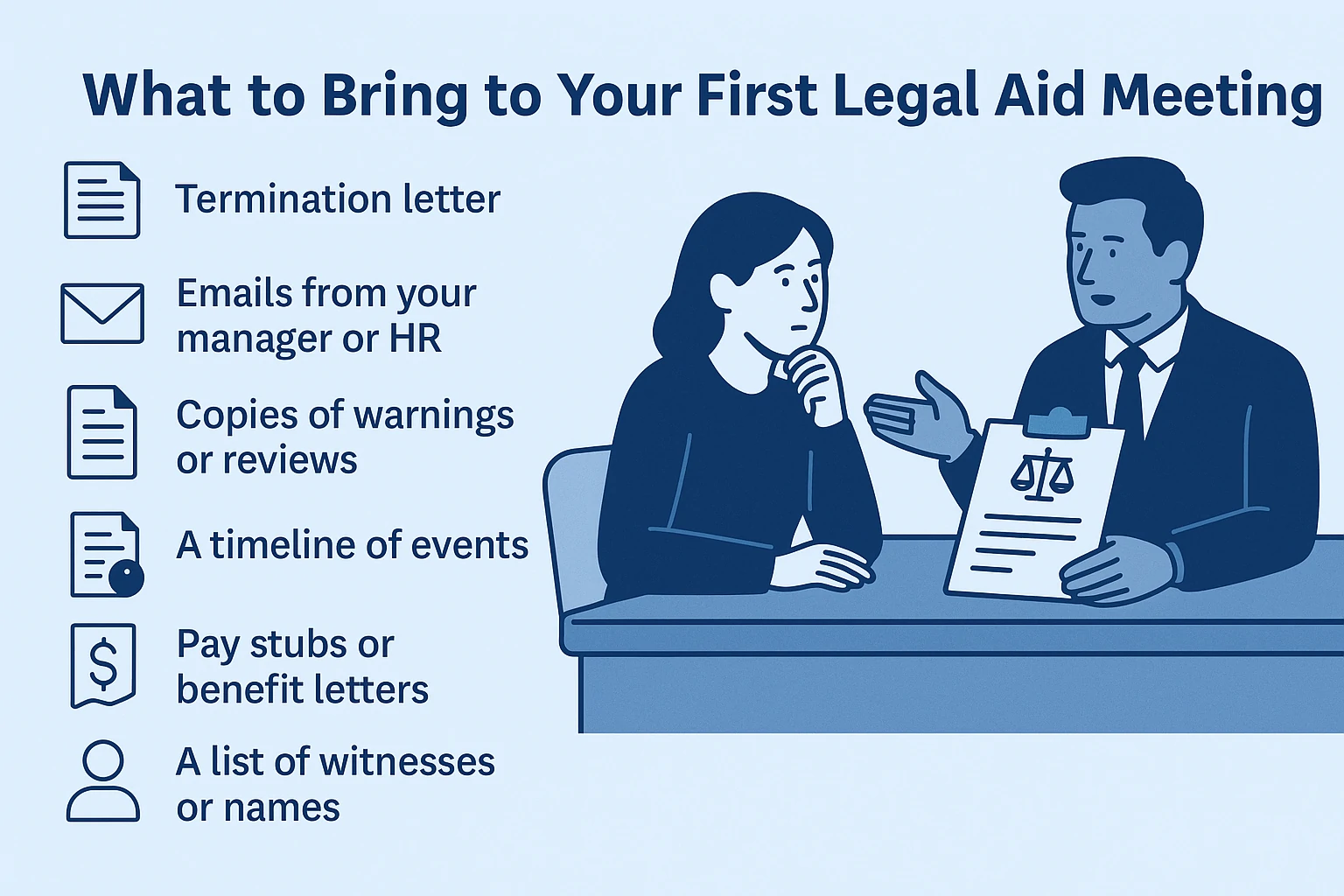
Bring all job-related papers with you. Your lawyer will need to see proof to understand your case. The more you bring, the better they can help.
Start with your termination letter. Add any emails from your boss or human resources. Bring copies of reviews, warnings, and job duties. If you made a timeline of events, bring that too.
Also carry your ID, any benefit papers, and past pay stubs. If someone saw what happened, list their names. Clear facts make your case stronger. A prepared visit saves time and helps the legal team move fast.
- Termination letter
- Emails from your manager or HR
- Copies of warnings or reviews
- A timeline of events
- Pay stubs or benefit letters
- A list of witnesses or names
What to Do Right After Getting Fired
Keep calm. Do not panic. Save every paper you receive from your job. Keep emails, reviews, letters, and forms. These may serve as evidence later.
Write down your own timeline. When did things go wrong? What did your manager say? Were there witnesses? Did you get warnings? Honest records help your case.
Do not sign papers if you feel unsure, and check other legal questions too (for example, see is jaywalking legal in California). Some agencies ask workers to sign releases or waivers. These could block your chance to appeal. Always ask a lawyer first.
Apply for legal aid as soon as you can. Federal job appeals have strict deadlines. In many cases, you must act within 30 days. Time matters more than anything else.
What to Do If You Missed the Appeal Deadline
Federal job appeals have strict deadlines. In most cases, you must act within thirty days. Some workers miss this deadline due to stress, lack of help, or confusion.
Even if time has passed, you may still have options. Some agencies allow late filings in special cases. You must show a valid reason for the delay. Illness, lack of notice, or other serious problems may count.
Legal aid can help review your timeline and explain what steps still exist. A lawyer may ask the Board or agency to reopen the case. They may also find other paths to protect your record.
Do not give up because of a missed deadline. Each case is different. Always ask a legal aid group before closing the door.
What to Expect During the Appeal Process
Once your legal aid lawyer starts the case, they will explain what comes next. You may need to file a claim with the Merit Systems Protection Board. Or your case may go through a different federal office, depending on the reason for your firing.
You may attend hearings or respond to agency claims. Your lawyer helps with each step. They will explain the law in plain words. They will help you feel ready to speak or stay silent when needed.
The process may take weeks or months. But during this time, your rights stay in place. The legal aid team makes sure no one takes advantage of you.
In some cases, you may get your job back. In others, you may get pay or benefits you lost. Even if your case does not win full relief, you may clear your record or protect your name.
Life After Federal Job Loss
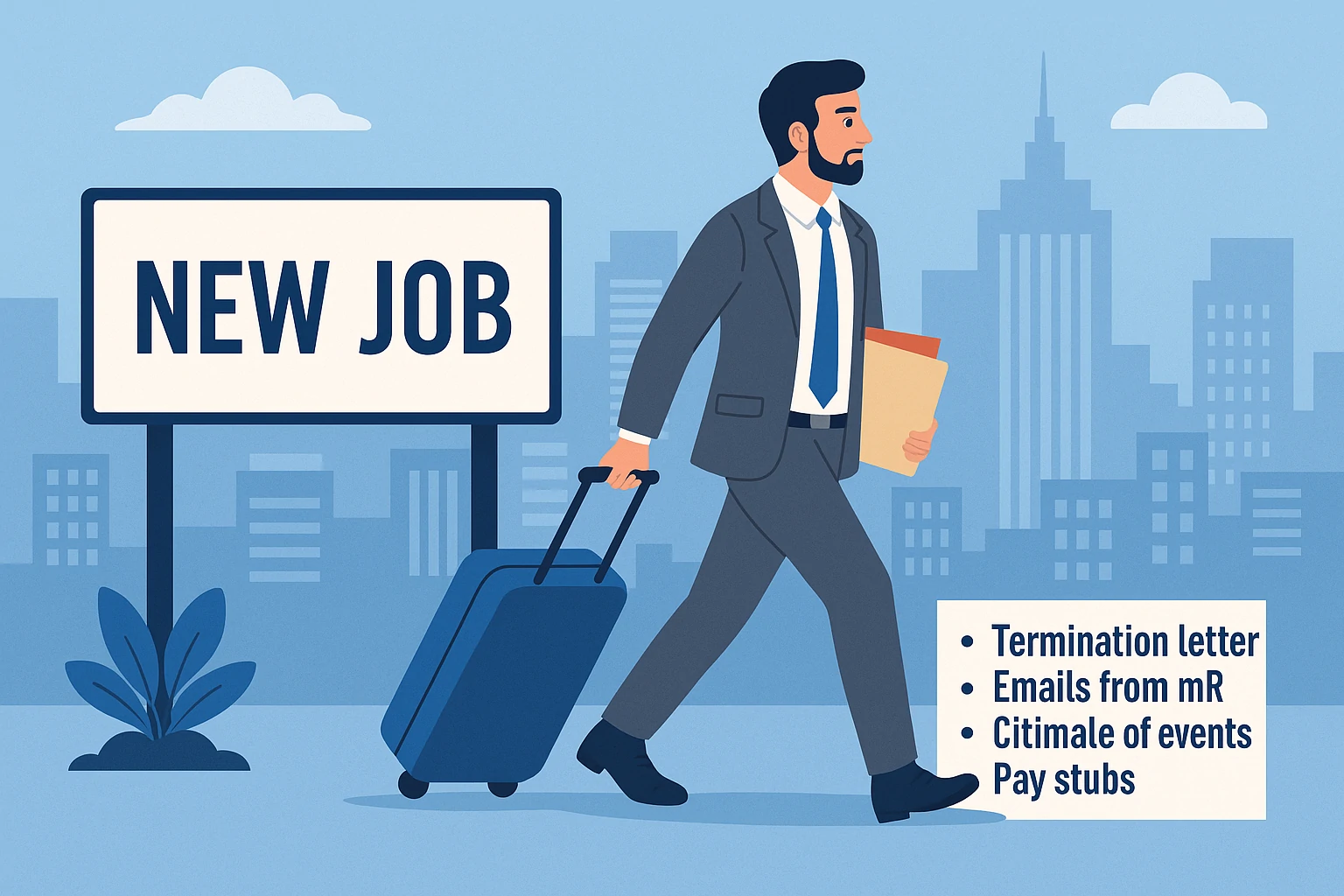
Losing a federal job does not mean the end of your career. Many workers move on and find new paths. Some return to federal work in other roles. Others start fresh in the private sector.
Legal aid can help you take control of the next step. They offer advice on how to explain your past job during interviews. They may help fix damage done to your employment file.
Some legal aid programs also connect you with job centers, support groups, or mental health services. These extras can make the transition easier.
Do not give up. What happens next depends on the actions you take now. The law protects workers who take smart, bold steps after a job loss.
How Federal Job Loss Affects Your Retirement and Benefits
Losing a federal job can affect more than income. It can also change your benefits, retirement plan, and future savings. Every federal employee builds credit toward retirement, so losing that time can make a difference later.
If you get fired, your contributions to the Thrift Savings Plan stay safe. You can keep the money there or move it to another account. Health and life insurance may stop, but some programs let you continue coverage for a short time.
Legal aid can explain what happens to your benefits. It can also help you request paperwork from your agency. If you believe the agency handled your benefits unfairly, legal aid can help you appeal that too. Knowing your rights keeps you from losing what you already earned.
Can You Reapply for Another Federal Job After Being Fired?
Losing one federal job does not block you from all future roles. Many workers apply again and find new positions. It depends on the reason for your removal and what appears on your record.
If your file shows misconduct, it may slow the hiring process. Some agencies review past terminations before making a decision. Still, a clean appeal or a clear explanation can help you move forward.
Legal aid can help fix errors in your work record. It can also guide you on how to speak about your past job in new interviews. With the right help, you can still return to federal work and rebuild your career.
Real Examples of Legal Aid Success Stories in Virginia
Case One
A federal clerk lost her job after reporting safety risks. Legal aid helped her appeal. The MSPB ruled in her favor. She returned to work and received back pay.
Case Two
Another worker was fired without cause. Legal aid showed the agency ignored key steps. The case closed with a clean record and a fair settlement.
Case Three
A disabled employee was denied medical leave. Legal aid stepped in and helped her recover lost wages. Her work file was corrected.
Conclusion
If you lost a federal job in Virginia, you are not alone. The rules may seem complex, but legal help is within reach. Legal aid gives you the power to act. It guides you through every step and defends your rights.
Virginia has a strong network of legal aid services. Each one is built to help people who face tough moments like job loss. You do not need money or legal skills to start. You just need to reach out and take that first step.
Legal aid lawyers stand with you. They help you speak up and fight for what’s right. They make sure no one pushes you aside without cause. Take charge of your future. You have more support than you think.
Further Reading on Law Topics
If you’re curious about other laws, check out related articles like Is lane splitting legal in Florida?
This article is for general information only. It does not provide legal advice. You should speak to a licensed attorney about your specific case. Laws may change, and each situation is different. We do not guarantee legal outcomes or offer attorney-client services.

